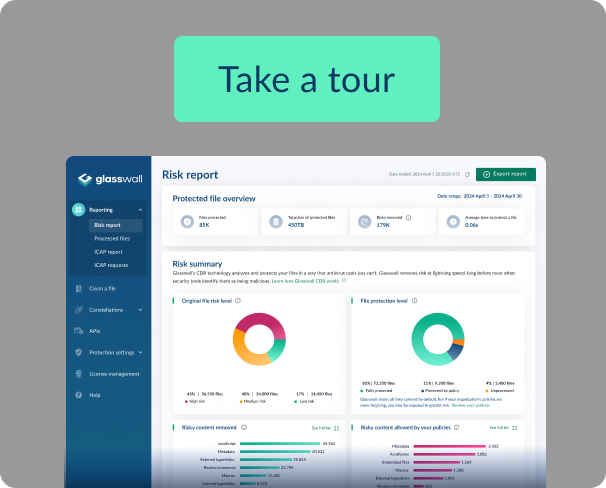Glasswall CDR capabilities
The Glasswall Embedded Engine lies at the heart of our suite of CDR solutions. Its various capabilities go above and beyond protection against malicious software. This provides security teams with powerful tools that help organizations comply with data protection regulations, transform file types, identify risky content and much more...

Protect Mode
Protect Mode is the core capability of the Glasswall Embedded Engine. It has been developed to disarm malicious files, returning them to their manufacturer’s known good file specification. This includes:

User-configurable policy settings
Content management policies give security teams control over which content types are processed, and how. This allows security policies to match an organization’s security posture at a granular level.

Automatic file corrections

Analysis Mode
Analysis Mode provides security teams with detailed reporting of all content discovered while the Glasswall Embedded Engine is inspecting a file.
In the event Protect Mode cannot be used (a file cannot be modified in transit), the report generated by Analysis Mode can be used to determine whether any risky content exists within a file.
The contents of this report can be parsed, making it presentable via a UI that simply describes the nature of a file and any actions that performed to secure it.

Transform Mode
Glasswall’s CDR Engine can transform and reconstitute complex data formats (documents, images, media, and binary files) into more simple/verifiable ones (SISL/XML). This capability exposes a file’s internal structure, enabling third parties to carry out hardware/software syntactic and semantic verification.

1. Transform

2. Verify

3. Reconstitute

Find and Redact (MS Office)
The Glasswall Embedded Engine can protect organizations against the leakage of sensitive information. Our Find and Redact function gives security teams the capability to specify forbidden words – the Embedded Engine then analyses a file and identifies, and then enacts the user defined policy.
The forbidden words are configured via policy, where the type of action to be applied to the matching text is also defined. The supported actions are redact, report or block the file.
Using methods such as regular expressions or by including entire text in the configuration allows security teams detect text at various scopes e.g., words, paragraphs, or sentences.
Future capabilities
Glasswall is already developing tomorrow’s protection solutions. We have a number of patents that will allow us to evolve our industry-leading protection capabilities, keeping us one step ahead. The following capabilities are in the pipeline for release in the near future:

Word Search and Redact (other text-based formats)
Glasswall will roll out the capability to other file formats to enable the search and redaction of forbidden words in formats such as PDF.



-large.avif)



